Solidarity with Morocco: one year of action
A year after the devastating earthquake that struck Morocco on September 8, 2023, which left three thousand people dead and many more thousands wounded and without shelter, the humanitarian situation remains critical. Fondation de France continues to help vulnerable populations, with local partners who take action where it matters – for the duration. It has already spent more than 4.2 million euros dedicated to the roll-out of 31 initiatives in the disaster zone.
Download "Solidarity with Morocco: one year of action"
Supporting rebuilds
Rebuilding collective infrastructures and housing is a priority, enabling the people affected to return to normal life and take up employment again.
Fondation de France focuses on the reconstruction of collective buildings such as schools community centers and cooperatives. The Horizons Foundation, Fondation de France and a company, Aromazone, have joined together to rebuild an argan oil production cooperative at Taroudant. In the regions damaged by the quake, this women’s cooperative, “Al Oukhowa”, will enable dozens of other cooperatives to continue with their work and sell argan from the trees. A new build on a plot provided by local authorities is better adapted to the needs of employees and complies with earthquake resistance construction standards.
In Ouarzazate, the earthquake damaged the sports center of nonprofit Marathon des sables (Marathon of the Sands). Reconstruction complied with green building and sustainable housing standards. Open daily, it offers sports activities to 200 children aged 3-12 and is undertaking a literacy program for women.
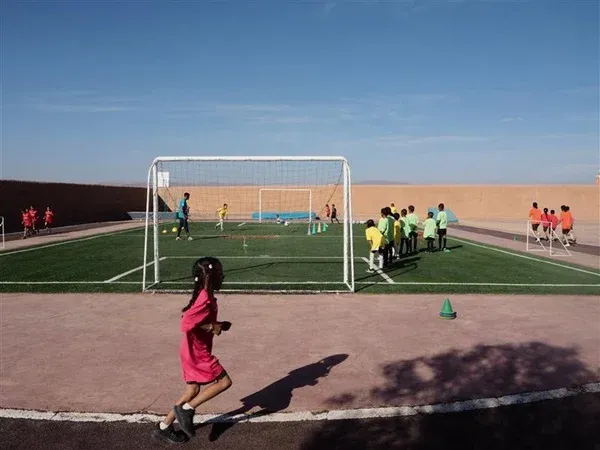 In Ouarzazate, nonprofit Marathon des sables rebuilt the sports center destroyed in the disaster and now welcomes 200 children every day.
In Ouarzazate, nonprofit Marathon des sables rebuilt the sports center destroyed in the disaster and now welcomes 200 children every day.
In the province of Chichaoua, nonprofit Al Jisr built new modular classrooms to replace those destroyed and welcome children from the region where the earthquake struck. It also equipped establishments, previously lacking sanitation, with twelve modular units. This enabled children, girls in particular, to access appropriate facilities.
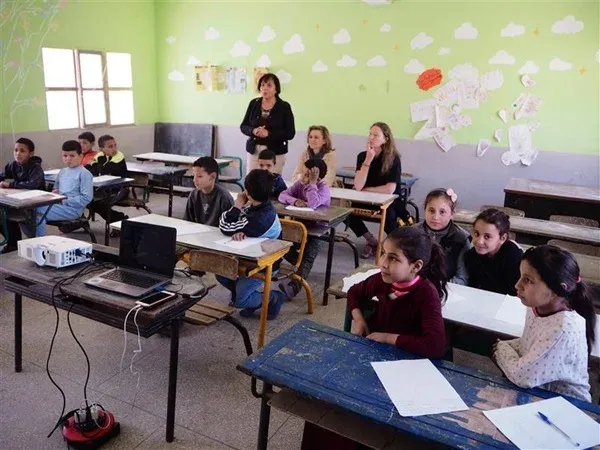 Axelle Davezac, Fondation de France Chief Executive Officer and Karine Meaux, Head of Emergencies visited the modular classrooms built by nonprofit AI Jisr in Tagadirt in the Souss-Massa region.
Axelle Davezac, Fondation de France Chief Executive Officer and Karine Meaux, Head of Emergencies visited the modular classrooms built by nonprofit AI Jisr in Tagadirt in the Souss-Massa region.
Maintaining access to education
The earthquake in the High Atlas made it particularly difficult for girls, already in a vulnerable situation, to go to school. Institut national de solidarité avec les femmes en détresse (National Institute for Solidarity with Women in Distress - INSAF), which combats literacy and school leaving in girls has intensified its action. It covers: the payment of tuition fees; rental premises for a welcome center in Marrakesh; recruitment of psychologists to help them regain confidence; and professors to teach French, English and science topics.
Jadara Foundation has been active in the education of vulnerable young people for more than 20 years. It helps 100 hundred young high school graduates and students from areas affected by the earthquake, by providing them with school grants and a comprehensive package of tutoring, coaching, language skills, information technology, etc. until they obtain their diploma.
The Béatrice Shönberg Foundation is currently renovating boarding schools damaged by the earthquake in Asni, at the foot of the High Atlas. Thanks to the work supervised by Fondation Architectes de l’urgence (Emergency Architects Foundation), around 50 young women from devastated villages will be able to continue with their studies.
Providing psychological support
In addition to vitally needed practical help, psychological support for the people affected is essential, so that latent post-traumatic symptoms can be avoided or treated. This mission was handed to Terra Psy, an association which created two mobile teams of mental health professionals who travel around isolated villages of the El Haouz region, to support people who present psychological and traumatic disorders.
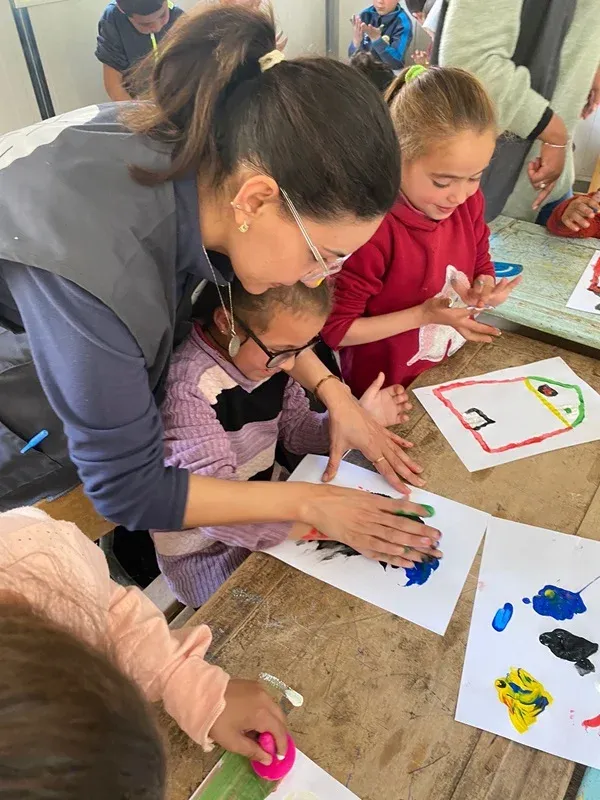 In the villages of the El Haouz region, nonprofit Terra Psy offers therapy workshops for children suffering from psychological and traumatic disorders.
In the villages of the El Haouz region, nonprofit Terra Psy offers therapy workshops for children suffering from psychological and traumatic disorders.
In the Taroudant region, Fondation Amane pour la Protection de l’Enfance (Amane Foundation for Child Protection - FAPE) is rolling out psychological and social support programs in 8 villages covering 250 children, more than 300 women and 350 men. The activities offered to children (drawing workshops and verbalization), women (support groups and psychological support sessions) and men (physical activity and group discussions) enable them to express their emotions, share their experience and re-create community relationships.
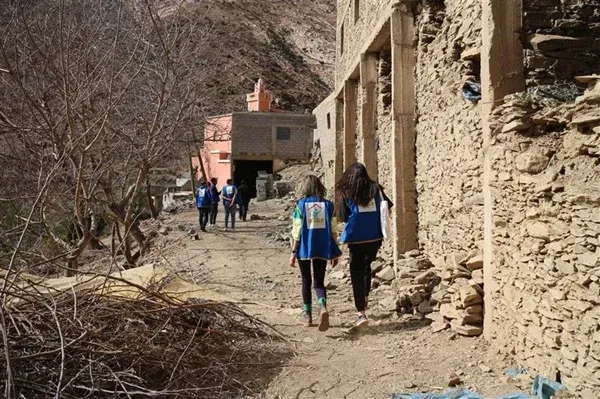 Teams from the Amane Foundation and Fondation de France in the villages destroyed by the earthquake.
Teams from the Amane Foundation and Fondation de France in the villages destroyed by the earthquake.
Contributing to economic recovery
In order to take part in the sustainable economic development of agriculture and food processing industries, the Norsys Fondation has set out plans for recovery, together with victims of families and local technical teams. The latter take into account available production factors, seasons and cycles, to ensure income in the short and medium term for vegetable and poultry farmers. It equips families with input and small equipment items, as well as livestock holdings.
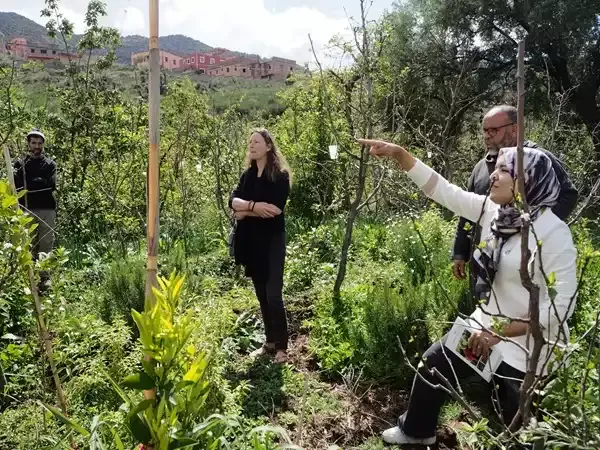 The Norsys Foundation offers agricultural recovery plans to disaster-stricken families.
The Norsys Foundation offers agricultural recovery plans to disaster-stricken families.
Farmers are also trained to acquire new professional skills in production and sales. In the towns of Asni and Ouirgane, the ISRAR coalition with a membership of thirty civil society organizations led a survey to compile the needs of destroyed cooperatives to re-energize the local economy. It trains cooperative members in management, marketing, e-commerce and provides them with the machines, equipment and supplies required to improve their productivity.
Crédit photos : © Sandrine Maximilien, Léa Lacheteau
TO FIND OUT MORE
→ Solidarity with Morocco: six months of action
→ Solidarity with Morocco: 3 months of mobilization to help the most vulnerable
→ Emergencies: rebuilding lives over the long term

